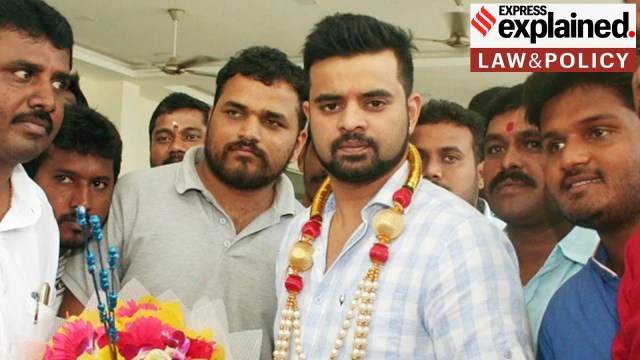After allegations of sexual abuse by Janata Dal (Secular) MP Prajwal Revanna came to light, the politician fled to Germany on a diplomatic passport. The Ministry of External Affairs (MEA) on Thursday (May 2) said that no visa note was issued to Revanna — but to travel to Germany, he did not need one. Here is why.
Unlike normal passports, which have dark blue covers and are valid for 10 years (for adults), diplomatic passports have maroon covers, and are valid for five years or less. Holders of such passports are entitled to certain privileges and immunities as per the international law, including immunity from arrest, detention, and certain legal proceedings in the host country.

The MEA’s Consular, Passport & Visa Division issues diplomatic passports (‘Type D’ passports) to people falling in broadly five categories: those with diplomatic status; government-appointed individuals travelling abroad for official business; officers working under the branches A and B of the Indian Foreign Service (IFS), normally at the rank of Joint Secretary and above; and relatives and immediate family of officers employed in IFS and MEA.
Lastly, diplomatic passports are also issued to “select individuals who are authorized to undertake official travel on behalf of the government”. This includes union ministers and MPs who often travel abroad representing the government. The validity of these passports is concurrent with the term of the MP. For instance, Congress leader Rahul Gandhi surrendered his diplomatic passport after he was disqualified as an MP last March.
Why did Prajwal Revanna not need a visa to travel to Germany?
Typically, the MEA issues visa notes to government officials going abroad for an official assignment or visit. But in Prajwal’s case, no such note was issued.
“No political clearance was either sought from or issued by MEA in respect of the travel of the said MP to Germany. Obviously, no visa note was issued either,” MEA spokesperson Randhir Jaiswal said on Thursday.
This is because Germany is among the 34 countries with whom India has operational visa exemption agreements for holders of diplomatic passports. According to a reciprocal deal signed in 2011, holders of Indian diplomatic passports do not require a visa to visit Germany, provided their stay does not exceed 90 days.
Story continues below this ad
India has similar agreements with countries such as France, Austria, Afghanistan, Czech Republic, Italy, Greece, Iran, and Switzerland. India also has agreements with 99 other countries wherein apart from diplomatic passport holders, even those holding service and official passports can avail operational visa exemption for stays upto 90 days. Countries in this list include Bahrain, Brazil, Egypt, Hong Kong, Oman, Singapore, and the United Arab Emirates.
Nonetheless, Prajwal should still have applied for a prior political clearance for a private visit. According to the latest bulletin issued by the Rajya Sabha Secretariat, “Members, when using a diplomatic passport, are required to apply for prior political clearance directly to MEA by using the link http://www.epolclearance.gov.in and ensure that before proceeding abroad the requisite political clearance has been obtained. Requests may kindly be made at least three weeks in advance”.
Who can revoke a diplomatic passport?
Karnataka Chief Minister Siddaramaiah, who has set up a Special Investigation Team to look into Prajwal’s sex abuse case, has requested Prime Minister Narendra Modi to cancel his diplomatic passport, and to take “such other steps using diplomatic and police channels of the government of India as well as International Police agencies to ensure the swift return of the absconding Member of Parliament to face the full force of law.”
However, in this case, the government can revoke Prajwal’s diplomatic passport only after a court order to that effect. “As regards the possible revocation of the passport of any individual, I would refer you to the relevant provisions of the Passport Act 1967. We are not in receipt of any directions from any court in this regard,” the MEA spokesperson said.
Story continues below this ad
As per the Act, the passport authority may impound or revoke a passport if the holder is in wrongful possession, or if it was obtained by the suppression of material information; or if the passport authority deems it necessary so to do in the interests of the sovereignty and integrity of India, or friendly relations of India with any foreign country.
It can also be revoked if the holder has, after the issue of the passport, been convicted by a court in India, and sentenced to imprisonment for not less than two years. Finally, a diplomatic passport can be revoked upon orders from a court during proceedings with respect to an offence allegedly carried out by the passport holder before a criminal court.








































